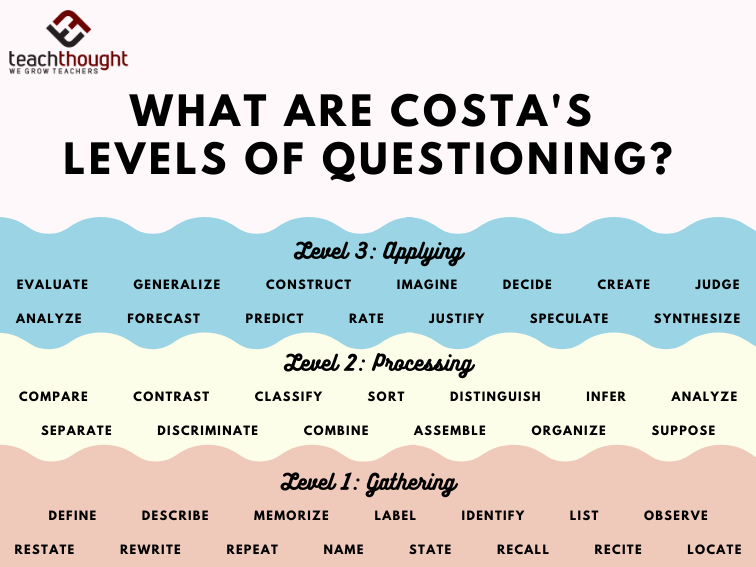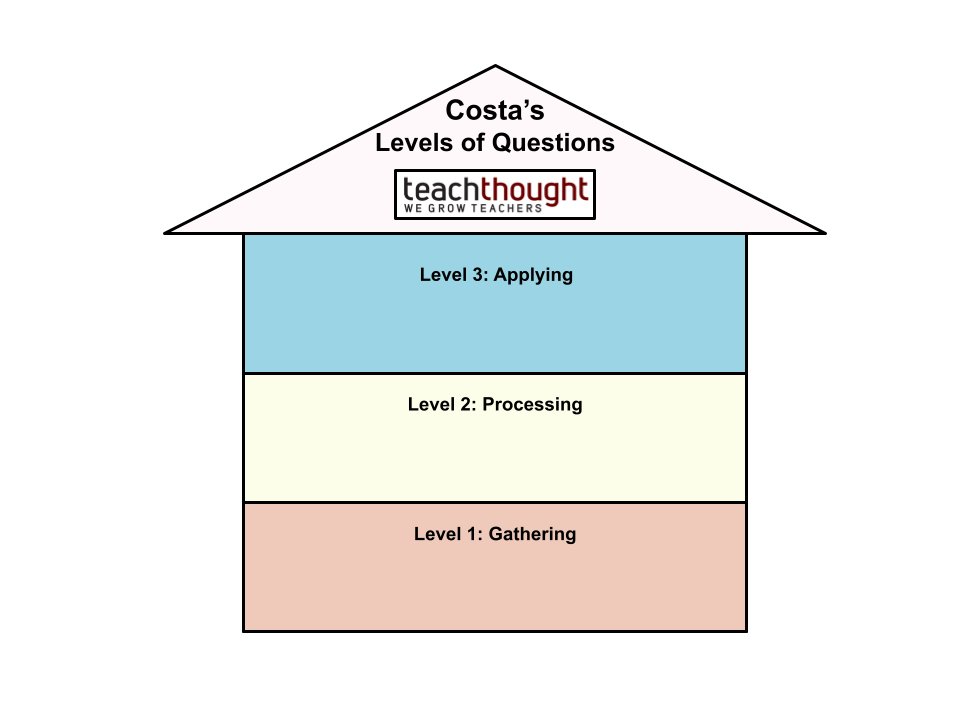

Costa’s Degrees of Questioning– made by academic scientist Art Costa– feature three tiers of examining developed to promote higher-level thinking and query.
Similar to Flower’s taxonomy , Costa’s lower degree motivates students to use even more basic professors; as trainees go up in degrees, the inquiries trigger them to use more complex reasoning skills. Through decades of study on human resilience, Dr. Costa likewise recognized the 16 Practices of Mind , a set of behaviors that support pupils in browsing the difficulties that usually take place in institution and life, in general. Several of Dr. Costa’s 16 routines– thinking interdependently, introducing, collecting data, and applying previous expertise to brand-new circumstances– both call for and strengthen higher degrees of doubting.
There is a substantive quantity of research that supports Dr. Costa’s schema. Newmann (1993 located that higher-order thinking compels trainees to “control info and concepts in ways that transform their meaning,” and “expects trainees to address problems and establish implying on their own,” which straightens with a constructivist view of education
Costa’s Degrees of Examining are commonly illustrated making use of the allegory of a home with 3 floors:


Degree 1: Gathering
Level 1 inquiries primarily need pupils to work with info ‘on the page.’ Response to level 1 questions are normally actual; definition, a student can actually indicate the solution on a page.
We’ve formerly written about Flower’s Taxonomy power verbs , so you can predict that Costa’s levels have their own collection of power verbs, as well. Here are a few that you could locate at the start of Level 1 concerns:
- Define
- Describe
- Remember
- Tag
- Recognize
- Listing
- Observe
- Restate
- Rewrite
- Repeat
- Name
- State
- Remember
- Recite
- Situate
- Select
- Match
- Program
Degree 1 concerns by content location may resemble these instances:
- Scientific research : Tag the parts of an animal cell.
- Mathematics : State the formula for finding the quantity of a cylinder.
- History : Suit the name of the monarch to their respective country.
- English Language Arts : Locate the place in the plot where the orgasm happens.
You can see exactly how a lot of these Degree 1 power verbs call for trainees to recall information, which is a vital ability in its very own right. Nonetheless, educators need to pursue most of their inquiries to fall in Level 2 or 3, which test pupils to utilize higher-order thinking abilities.
Degree 2: Processing
Degree 2 inquiries go an action additionally than Level 1, prompting pupils to process info by ‘analysis between the lines.’ While trainees may require to make use of actual info to create their feedbacks, Degree 2 requires them to refine that information with what they currently know in order to make new connections.
Here are some examples of Level 2 power verbs:
- Contrast
- Comparison
- Classify
- Type
- Distinguish
- Presume
- Evaluate
- Separate
- Differentiate
- Incorporate
- Construct
- Organize
- Suppose
Degree 2 inquiries by content area might appear in the adhering to means:
- Scientific research : Contrast the processes of mitosis and meiosis.
- Math : Identify the geometric shapes according to their number of sides and angles.
- History : Assemble the complying with historic events in the order of relevance, from a lot of to the very least.
- English Language Arts : Analy ze the influence that the writer’s tone carries the overall meaning of the text.
Can you see just how Degree 2 concerns go a step further than Degree 1 More than merely spewing info, students take it and ‘do something’ with it. They categorize, make distinctions, and compare/contrast it against one more component to see just how it impacts the whole. These type of abilities can promote interest and construct a bridge to the inquiries that truly create creativity and higher-level reasoning.
Level 3: Applying
While Degree 1 questions trigger pupils to collaborate with input, and Level 2 questions challenge them to process that input in order to make new links. Here, trainees take part in the highest-level reasoning skills to create an output. This could result from making evaluations and evaluations, screening options to different issues, or making forecasts.
We’ve consisted of some examples of Level 3 power verbs listed below:
- Evaluate
- Generalize
- Create
- Think of
- Determine
- Produce
- Court
- Evaluate
- Forecast
- If/then
- Forecast
- Rate
- Justify
- Guess
- Manufacture
- Construct
- Hypothesize
Degree 3 concerns by content location may resemble the following:
- Scientific research : Based upon information from the last decade of storm activity in the southeast united state, predict exactly how the frequency of storm task will change in the next 10 years.
- Mathematics : Rate the likelihood of a presidential candidate winning the political election based upon securing the electoral ballots from the adhering to united state states: Florida, California, Virginia, New York, Illinois.
- Social Studies : Develop a social compact that takes into consideration the results of globalization and technical development in the 21 st century.
- English Language Arts : Develop a disagreement that protects or shoots down mandatory worker vaccination plans in the USA.
Whether planning for discussion-based tasks, project-based discovering, or independent questions, educators must make every effort to orient the majority of pupil thinking and engagement at Degrees 2 and 3 Assessments that trigger students to remember fundamental facts (such as the date of a historic event, or the name of a writer, or the formula for a formula) do not really examine trainees’ capability to use brand-new skills or details to brand-new contexts. A Degree 2 or 3 concern would certainly test pupils to make links with fundamental details. For instance, instead of remembering a mere day, an extra flexible question would ask pupils to forecast, based upon the time in background that a particular event took place, the chance of it persisting, offered a similar sociopolitical environment. Along the same lines, rather than remembering the names of famous writers, a teacher might challenge trainees to make an argument for exactly how an author would certainly write about a certain contemporary problem.
In “A Talk to Teachers,” James Baldwin described the mystery of education and learning: “As one begins to end up being mindful, one begins to analyze the society in which [they] are educated.” Degree 2 (and primarily, level 3 concerns intend to cultivate this kind of response in trainees, to trigger them to turn their heads, do double-takes, point out disparities, disrupt the status, identify imperfections in current organizations, and create ingenious solutions for those defects. These are the questions that inspire us ahead up with even more concerns, to consider our thinking, and to evolve– both as individuals and cultures.